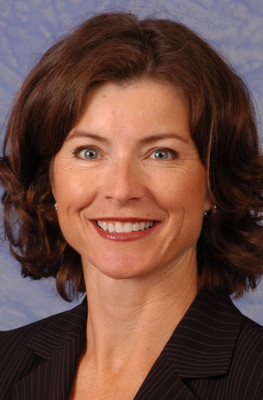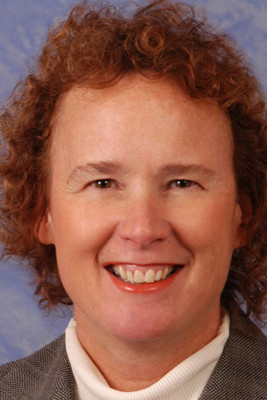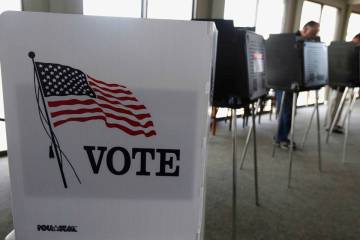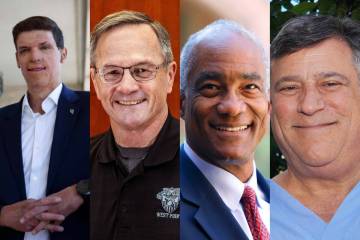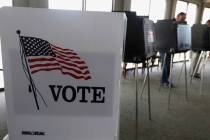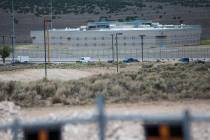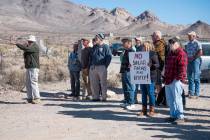Budget balancing act ready
CARSON CITY -- They may resort to bubble gum, bandages and baling wire to cover the state's $341.7 million shortfall when they meet in a special session Monday, but legislators are determined to carry out their constitutional duty to balance the state budget -- and quickly leave town.
Assemblywoman Sheila Leslie, D-Reno, is so confident the plan has wide support that she predicts lawmakers will spend less time in Carson City than when they cut spending by $275 million in a 12-hour special session on June 27.
"It gets us through the immediate crisis," she said. "It avoids layoffs. It will be easier than in June."
The bailout plan consists of securing a $160 million loan, cutting expenditures of a limited number of state agencies by a combined $72.8 million, taking $76.7 million from reserve funds of other agencies and securing a $28 million advance payment of taxes from mining companies.
Leslie pointed out that Nevada state government already has cut state spending over the last year by $1.2 billion, much of it by not filling 2,700 job vacancies.
State government operates under a two-year budget of $6.8 billion. Tax revenues are expected to decline by 9.1 percent in the fiscal year that ends next June 30.
That has prompted the need for a special session to find ways to make up the $341.7 million shortfall and balance the state budget.
What happens in the special session won't solve state government's long-term fiscal problems.
When legislators return Feb. 2 for their regular 120-day session, they are expected to be forced to make additional cuts, since tax revenue in the next two-year budget period is projected to be $5.65 billion, nearly $1.2 billion less than the current period.
The National Conference of State Legislatures, in a report Thursday, placed Nevada behind only Arizona and New Hampshire on the list of states hardest hit by the recession.
Thirty-eight states have spending gaps, or situations where tax revenues are less than their budgets.
Minority Leader Heidi Gansert, R-Reno, isn't as confident as Leslie about a swift conclusion to the special session, the 25th in state history.
But Gansert does see approval of the plan to address the shortfall coming at least by Tuesday, even if a few legislators vote against it.
Legislative staff members finished checking sound systems, changing legislators' nameplates and moving desks around Friday.
The nameplate identifying Steven Horsford, 35, as state Senate majority leader was put in place in the Senate chambers.
He replaces 82-year-old Bill Raggio, R-Reno, who has been majority leader in 10 of the last 11 legislative sessions.
With the victories of Clark County Democrats Shirley Breeden and Allison Copening over incumbent Republican state Sens. Joe Heck and Bob Beers in the Nov. 4 election, the Democrats emerged as the majority party in the state Senate. They hold a 12-9 advantage.
In the Assembly, Democrats gained one seat on Nov. 4 and now hold a 28-14 lead over Republicans. Barbara Buckley, D-Las Vegas, returns as Assembly speaker.
Lorne Malkiewich, the Legislature's top administrator, figures it will cost $80,000 to $100,000 for a one- or two-day special session.
Legislators are entitled to daily pay of about $146, along with a per diem allowance of $167.
Even the oldest citizens of the state probably wouldn't remember the last time Nevada's Legislature resorted to taking out a loan to balance the state budget.
Gov. Tasker Oddie balanced the budget by taking a loan on a state school fund when he called legislators to a special session on Feb. 22, 1912, when all of 80,000 people lived in Nevada.
So the loan proposal under consideration Monday "is not unprecedented," Gov. Jim Gibbons said during a Friday news conference.
The centerpiece of the budget-balancing plan of Gibbons and legislators will be securing a $160 million line of credit from the Nevada Local Government Investment Pool.
The pool consists of money that cities, counties and schools have given to the state treasurer to invest on their behalf.
State Treasurer Kate Marshall suggested three weeks ago that Gibbons tap into the pool if necessary to cover budget shortfalls between now and July.
She said state government would pay the money back over the next four years at interest rates of less than 2.5 percent.
Gibbons said he does not like saddling future residents with a debt, but Nevada is suffering an economic crisis it may not have experienced in generations.
"I am always concerned when we push to the future an obligation that the taxpayers of the state will have to make up," he said.
"Extraordinary times require extraordinary measures," Gibbons added.
Although Gibbons and legislators have been mum on where the $72.8 million in cuts will be made, one source said the hardest hit department will be the Department of Health and Human Services.
That agency administers funds for mental health, welfare, Medicaid, foster care, adoption, senior citizen prescription drug and tax rebate programs.
The Corrections Department budget will not be cut, according to the governor.
Budget Director Andrew Clinger said no teachers will be laid off during the current fiscal year, although he would not make the same promise for the fiscal year that begins July 1.
"There are no easy choices," Gansert said. "All the cuts will be difficult. I am sure you are not going to see unanimous approval."
Contact Capital Bureau Chief Ed Vogel at evogel@reviewjournal.com or 775-687-3901.
BAILOUT PLAN
• Secure $160 million loan
• Cut expenditures of some agencies by $72.8 million
• Take $76.7 million from other agencies
• Get $28 million in advance tax payments from mining companies



